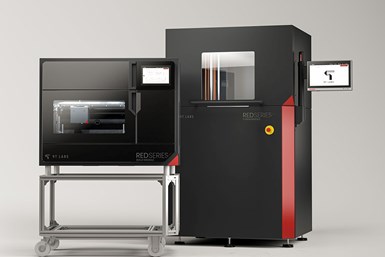Solvay, 9T Labs Collaborate on Carbon Composite Parts for Mass Production
High-performance composite materials plus the hybrid additive fusion solution process is said to lower production costs for advanced composite parts.

9T Labs’ Build and Fusion modules.
Solvay, a high-performance resin and carbon fiber-reinforced composites supplier, is working with 9T Labs, an advanced manufacturing solution OEM, to help bring additively manufactured (AM) carbon fiber-reinforced plastic (CFRP) parts to mass production.
The joint effort will focus on development of carbon fiber-reinforced polyetheretherketone (CF/PEEK); CF-reinforced, bio-based, high-performance polyamides; and CF-reinforced polyphenylene sulfide (CF/PPS) composite materials from Solvay for use in 9T Labs’ hybrid 3D printing/molding platform. The collaboration is focused on producing more repeatable and affordable, low-to-medium volume and size parts for the aerospace, medical, luxury/leisure, automation, and oil and gas industries.
The collaboration also significantly expands the types of neat and carbon fiber-reinforced materials portfolio that 9T Labs currently offers customers.
“With 9T Labs’ innovative process and equipment, and Solvay’s high-performance thermoplastic materials, we are well positioned to address problems that have long plagued manufacturers in many industries trying to use advanced composites — namely high incremental costs, high scrap and problems achieving repeatability and traceability,”says Marco Apostolo, Solvay’s director of technology. “We believe this collaboration will help solve many challenges and will open entirely new markets and applications to CFRP materials.”
According to 9T Labs, metals still prevail for the fabrication of structural parts because the manufacturing of structural CFRP parts has not been cost-competitive. “The Red Series platform in combination with Solvay’s high-performance and recyclable materials will change this and make CFRP parts more sustainable, accessible and cost-competitive, especially at higher volumes,” says Giovanni Cavolina, 9T Labs co-founder and chief commercial officer.
9T Labs’ hybrid manufacturing technology enables high-performance structural parts — in challenging small-to-medium size and thick sections — to be produced in carbon fiber-reinforced thermoplastic composites in production volumes ranging from 100 to 10,000 parts/year. By combining 3D printing with compression molding in matched metal dies, the hybrid production system is said to offer the best of both AM and conventional/subtractive manufacturing.
Related Content
-
3D Printed Preforms Improve Strength of Composite Brackets: The Cool Parts Show Bonus
On this episode, we look at a pin bracket for the overhead bin of an airplane made in two composite versions: one with continuous fiber 3D printed reinforcements plus chopped fiber material, and one molded from chopped fiber alone.
-
3D Printed Human-Operated End-of-Arm Tooling Promotes Safety and Throughput
Toolmaker and injection molder Zero Tolerance developed a manual tool to enable an operator to quickly place inserts into a mold.
-
Louisville Slugger Uses Formlabs Technology to Accelerate Innovation
Louisville Slugger relies on Formlabs’ Form 3 stereolithography 3D printer to create both prototypes and manufacturing aids for designs of the composite and aluminum bats swung by youth and collegiate players.













